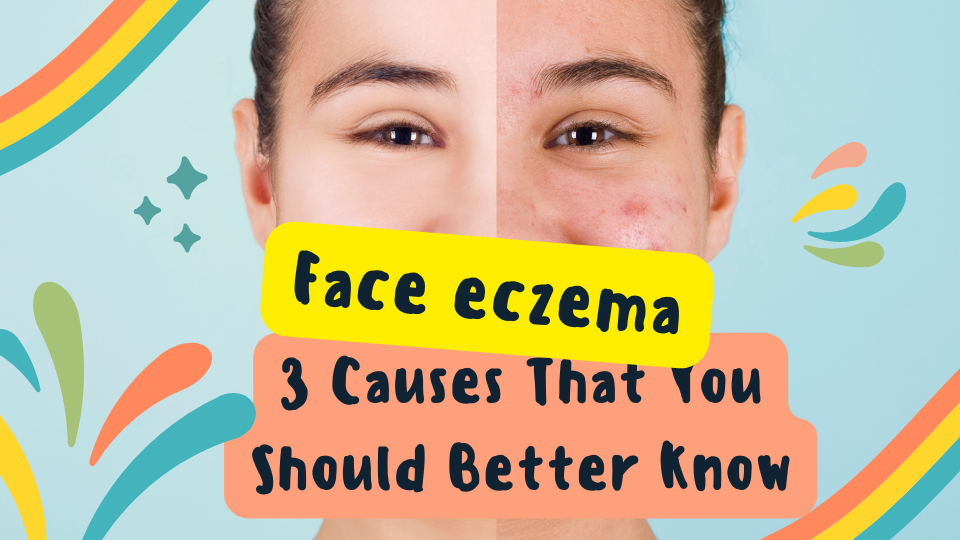There is a widespread misunderstanding that face eczema may be passed from person to person. The fact of the matter is, however, that eczema cannot be transmitted from one person to another. There is a widespread misconception that those exposed to another person with eczema are more likely to get the skin ailment themselves.
Table of Contents
What is face eczema
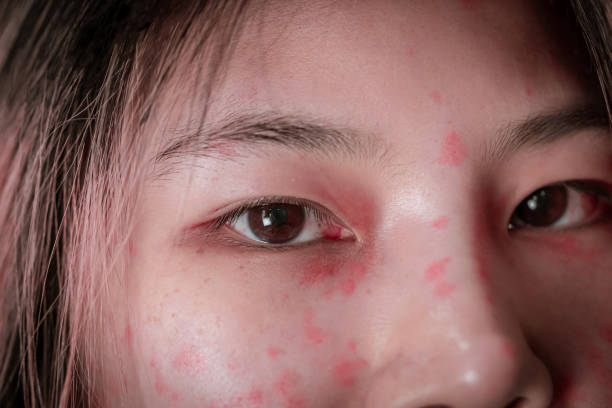
Face Eczema is a form of skin condition known as dermatitis, a kind of inflammation. It is known as atopic dermatitis, which indicates that an overactive immune system brings it on and that there is a hereditary component to the condition.
This particular kind of eczema manifests itself on the face and neck, but it also has the potential to impact the scalp, ears, and upper torso. Children often get afflicted with it between the ages of two and five.
The most common manifestations of this illness include a ruddy complexion, dryness, an itchy sensation, and sometimes crusting or scaling. Inflammation will also occur on the skin, which may cause it to feel tight or rough when touched.
Creams and ointments that include steroids such as hydrocortisone or calcineurin inhibitors such as pimecrolimus or tacrolimus are effective treatments for face eczema.
Face Eczema Treatment
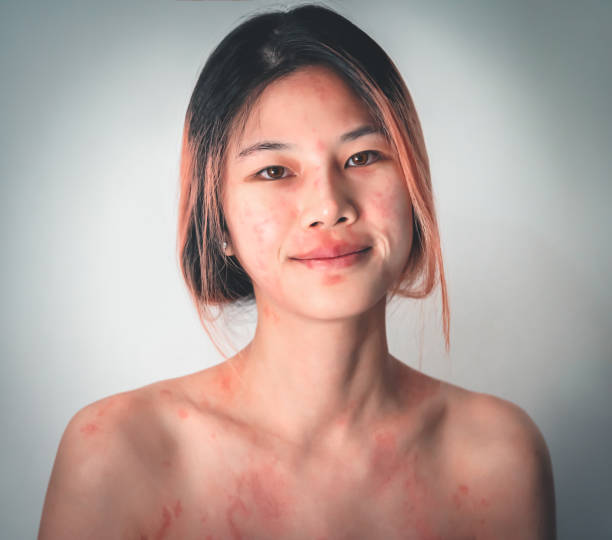
Face eczema is a condition that cannot be healed, yet its symptoms might come and go. It’s possible that years will go by without a single flare-up. When you have symptoms, you may learn how to manage them and find relief with the assistance of your doctor. Here’s how to treat eczema on the face.
Creams containing steroids. Look for the best product of face eczema cream. These are essential components of the therapy for eczema. A hydrocortisone cream that is available over the counter may help treat skin that is red and itching. Apply it to your skin once or twice daily for the next several weeks. If it doesn’t work as effectively as it should, your doctor may prescribe a stronger steroid medication. However, since it might cause your skin to become more fragile, you should limit how long you use it. You may learn more about corticosteroids and how they function by seeing a slideshow.
Calcineurin inhibitors. These may be prescribed to you by your doctor rather than steroid cream. These lotions and ointments protect your skin against chemicals that might trigger an outbreak of your eczema. They are most often used to treat facial eczema seen on the face, including the eyelids, the neck, and the skin folds. View a slideshow to learn about the many treatments available for eczema.
Look for signs of fungi. If a fungal infection brings on your face eczema, your physician may provide anti-yeast ointments or lotions. People with atopic eczema may have abnormally high quantities of a kind of yeast that is ordinarily present on their skin, particularly on their heads or necks. Investigate more into the topic of skin infections caused by fungi.
Phototherapy (ultraviolet light therapy). If your eczema is moderate to severe and cream treatments haven’t helped, you could get relief. It is important to remember that prolonged exposure to this kind of therapy may increase the risk of developing skin cancer. Take a look at this slideshow to learn more about the advantages of light therapy.
Causes of eczema on the face
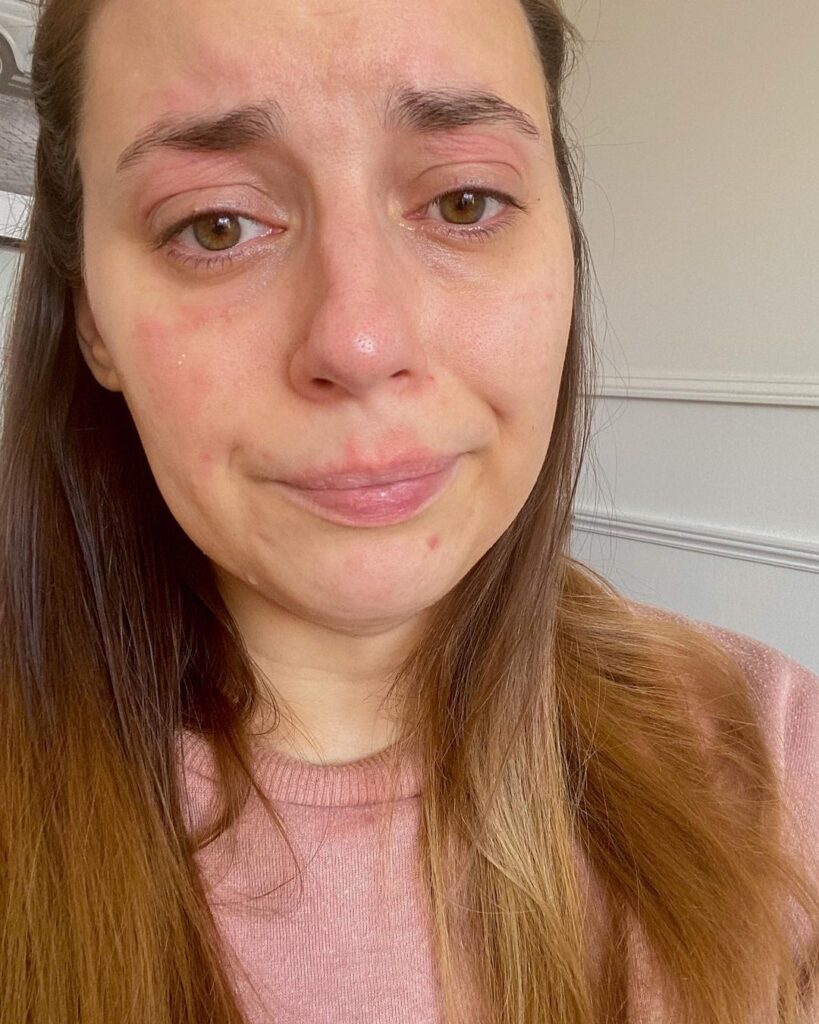
Face eczema is a disorder that leads to skin inflammation and may be very uncomfortable. Redness, swelling, itching, and dryness are all potential side effects of inflammation.
Although eczema appears on the face and hands the vast majority of the time, it may also manifest itself in other body parts. Atopic dermatitis and seborrheic dermatitis are types of facial eczema that are diagnosed most often. Both of these illnesses can potentially cause your face to become irritated and red. Additionally, choosing the right product for facial use is essential if you have eczema.
Irritants in your environment: Whether or not you suffer from allergies, there are many things in your environment that can irritate your skin. These include, but are not limited to, plants and animals, soaps and detergents, clothing fabrics, air pollutants like smoke, and the humidity level.
An immune system that reacts too quickly: Your immune system is responsible for helping your body defend itself against harmful external invaders such as bacteria and viruses that may cause illness. If you suffer from face eczema, your immune system may confuse the cells of your skin, minor irritants or allergens in your surroundings for foreign invaders, and launch an assault against them. Because of this, your skin will swell up and start to itch.
Your Genetics. How proteins in your body maintain the barrier in your skin that protects you from the outside world may be affected by a change in the DNA sequence of your body, often known as a genetic mutation. If there is a history of the problem in your biological family, you may have an increased likelihood of acquiring face eczema at some point in your life.
Symptoms of eczema on the face
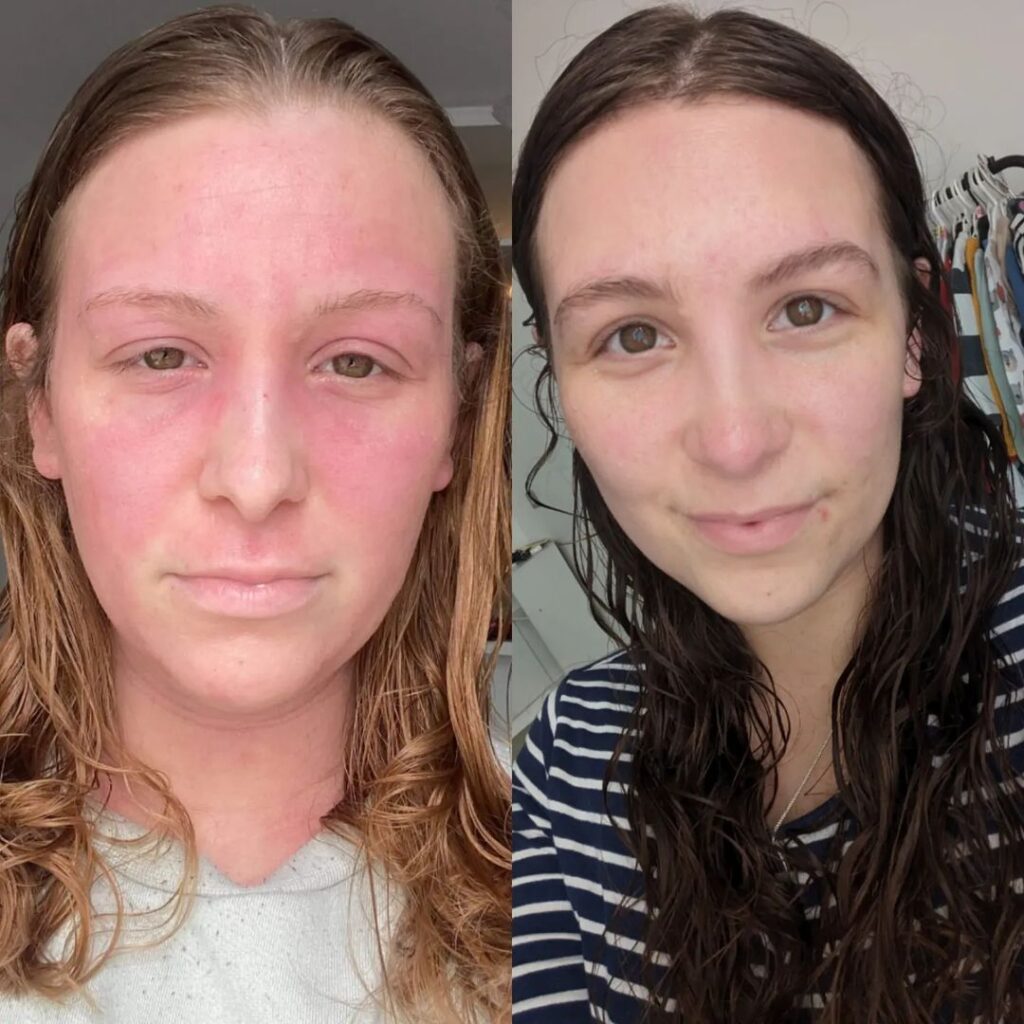
When you have face eczema, it may be difficult to determine whether or not it is an indication of anything else going on in your body. In general, there are many distinct kinds of eczema, and each of those kinds might impact a different portion of your body. Here are the eczema on face symptoms.
- Redness
- Itchiness
- A dry and flaky appearance
- Blisters or sores
- A crusting on the surface of the skin
- A rash that has the appearance of scales
FAQs
How do I get rid of eczema on my face?
Using an over-the-counter moisturizer containing corticosteroids is the most effective technique to treat face eczema. Corticosteroids inhibit the synthesis of cytokines, which are inflammatory molecules that contribute to skin inflammation and irritation. Daily application of corticosteroids directly to the afflicted region is required for their efficacy. Additionally, you should avoid using soap on your face if you have eczema since it might exacerbate the condition by further drying your skin. Consider using a mild cleanser, such as Cetaphil Gentle Skin Cleanser or Aveeno Daily Moisturizer with SPF 30+.
What triggers eczema on face?
Dry skin is the most prevalent factor that leads to the development of face eczema. Dry skin may be brought on by being exposed to cold weather, hot water, or soap. Scratching or cleaning your face too roughly with abrasive materials may also result in this condition since it disrupts the protective barrier of your skin.
How can I treat eczema on my face at home?
Maintaining clean and moisturized skin is essential if you want to cure face eczema. You should wash your face with water and a cleanser every morning and every night. Use a gentle cloth and gently pat your skin to dry it off. Do not massage or scrape your skin since doing so may cause it to become even more irritated, which can ultimately result in scarring or an infection. If you want to treat the symptoms of face eczema using over-the-counter treatments, seek those that have corticosteroids and/or antihistamines in their list of ingredients. If you want to treat your body’s symptoms of face eczema, look for products containing steroid creams.
Is eczema on face curable?
The face eczema may be cured. Eczema on the face may be brought on by various things, such as allergies, stress, or even just plain old heredity. If you are aware of what’s triggering eczema on your face, you may be able to alleviate or perhaps get rid of the condition altogether. Make an appointment with your doctor if you are unable to determine what is causing eczema on your face, but the issue has continued for more than two weeks. A medical professional can assist in determining what is causing it and can also assist in treating it.
Conclusion
In conclusion, eczema is a chronic skin ailment that causes its victims to experience a great deal of discomfort and annoyance. Scratching, a common symptom of the illness might open the door to bacterial infections, another potential risk associated with the condition.
It has been shown that CBD oil can assist with the symptoms of eczema for many individuals, just as it has with other ailments. People with easily irritated skin are more likely to have allergic responses. For instance, if you have significant seasonal allergies, your face may break out in a rash and sometimes develop into full-blown acne.
This might happen if you have a history of acne. On the other hand, some individuals treat acne as if it were a separate condition that needed to be healed, while acne is often only a sign of something else that is causing the problem. People with sensitive skin almost often also struggle with asthma, allergies to food and/or the environment, and a wide range of other conditions connected to irritants.

